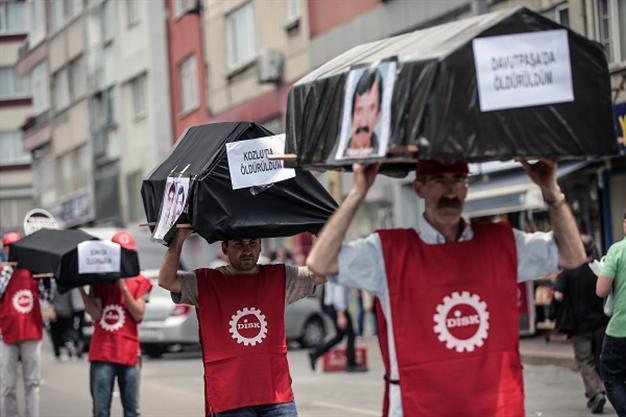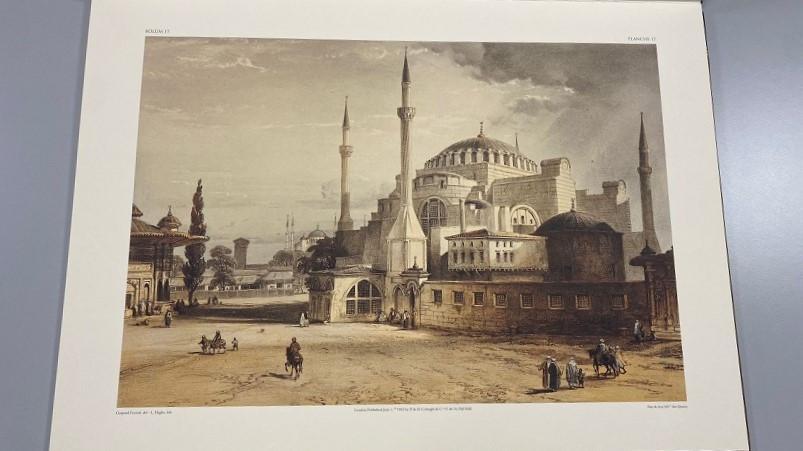BLOG: Market economy, commons economy and Soma catastrophe
Zeki Ergas (*)

Thousands of people, some carrying mock coffins for the victims, march to protest the Soma mine disaster that killed 301 miners last week, in Istanbul, Turkey, Sunday, May 25, 2014. The writing at the center reads: " I have been killed in Kozlu (mine) "(AP Photo/Emrah Gurel)
A market economy is profit-oriented; a commons economy is people-oriented. A healthy economy is one that has an equilibrium or balance between the two. When the two are in imbalance or disequilibrium, then the economy is unhealthy and catastrophes like the one in Soma happen. Imbalance or disequilibrium between the two means that too much emphasis is put on a profit-oriented market economy. The latter, these days called a neo-liberal economy, is based on private enterprise. Productivity is its central concern because it allows the generation of enough income in the form of profits for investors and wages, salaries and bonuses for the managers, employees and workers.A healthy economy requires an acceptable degree of sharing or distribution of the income generated by the market economy. That produces the balance or equilibrium that is indispensable in a healthy economy. Assuming that it ever existed, which is not necessarily the case, that balance or equilibrium has been quite drastically broken in Turkey lately and, as a result, catastrophes like that in Soma occur. Greed is a basic element in the loss of an acceptable balance or equilibrium, because it allows corruption to get out of hand. In the present situation, that manifests itself in investors and managers getting a disproportionately bigger part of the economic pie, and the workers and employees receiving a disproportionately small part. That is not only an unhealthy situation, but one that is also dangerous because it could lead to social unrest, confrontation, conflict and even civil war.
How, or what to do, to bring back a healthy economy that is in equilibrium or balance? This is where the commons economy comes in. In fact, a people-oriented commons economy has always existed. But, in the last 30 years or so, it has developed considerably thanks to the work of researchers such as Elinor Ostrom, Peter Barnes, Peter Linebaugh, James Quilligan and Silke Helfrich. Ostrom, who passed away in 2012, was awarded the Nobel Prize for Economics in 2009 for her work on the subject. She was the first woman to win it. Her book “Governing the Commons,” published in 1990, in which she developed the concept of Common Pool Resources (CPRs) is now considered a classic. In it, she gives many examples of successful CPRs, such as the Mongolian grasslands management system, the lobster fisheries in Maine, and the Acequia irrigation systems in New Mexico.
Quilligan, meanwhile, in his essay “The Political Economy and the Inclusive Commons,” writes: “The Commons ... allow the traditional model of property ownership, based on utility, self-interest and profit, to be replaced by a new framework ... based on trust, quality of life and well-being.” The commons economy makes a fundamental distinction between resources and gifts. Resources include agricultural land, mineral and fossil fuel resources, forests, rivers, lakes, aquifers, grazing lands, fisheries, and so on, which can be owned privately or publicly, or shared by communities. For gifts such as the air, water, languages, genetic codes, music, national parks, the Internet, and so on, which are owned by communities, three important rules apply: 1) They cannot, and should not, be “commodified,” that is, bought or sold; 2) They are “inclusive,” as opposed to “exclusive,” that is, they belong to everyone and not to an individual or a corporation; 3) They must be protected and passed on to the future generations intact, that is, undamaged by overuse or over-exploitation. It is important to remember that the commons is everywhere, but that it can often be invisible, and that which is invisible can be destroyed by the forces of greed and profit. As a result, we only become conscious of its enormous value to us when it is no longer there because it has been destroyed.
To conclude, it may be time to establish a healthy and balanced economy in Turkey, to start paying close attention to the ways and means of expanding the commons economy. This is the necessary condition of a balanced and healthy economy in which catastrophes like that which occurred in Soma, as well as serious social unrest, would not happen.
(*) The author, a leading member of PEN International’s Writers for Peace Committee, is a political economist who teaches in Hacettepe University’s Master’s Program of Peace and Conflict Studies. He is also writing a family saga, the second volume of which is set between 1929 and 1945 in Turkey, Palestine and the United States.
















